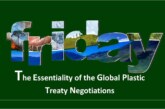
A recently released report by the World Bank was cautioned that water scarcity triggered by climate change can result in some regions losing 6 per cent of their GDP along with triggering forced migration and conflict. According to the report, even water-abundant areas like Central Africa and East Asia are likely to face water scarcity and in water-scarce areas like Middle East and parts of Africa the situation would worsen. It is reported that by 2050, the situation would become irreversible and maybe earlier and adversely affect agriculture, health and incomes. Burgeoning populations, higher income and ever expanding metropolises will exert more pressure on demand for water, even as already limited supplies become more uncertain and erratic.
While asserting that mismanagement of climatic change is the root cause of water scarcity, which results in episodic flood and droughts in areas dependent on rainfall and triggering mass migration as food and means of livelihood become scarcer, the report suggests that by simply better managing available water resources, we can turn negative impact into positive and if allocation as little as 25 per cent of available water is made to high value uses like agriculture, the losses will come down sharply.
Emphasizing on the need for better management backed by strong policies in arid areas, the World Bank report suggests that focused policies and investments will ensure water security and help in building economies that are more resistant to climate changes. We must better plan water allocation, incentivize water efficiency and invest in infrastructure to ensure security and availability of scarcer water resources.
There is no gainsaying in the fact that water is at the core of implementing the Sustainable Development Goals (SDGs) and climate change hence water security is pivotal to achieve SDGs. Without managing water resources other development goals like eradication of hunger and poverty, food and energy security and better quality of life will remain elusive. Water is at the focal point of socio-economic development. Water is vital to grow food, generate energy, manage our environment, create jobs and ensure good health. We need to act ‘now’.



